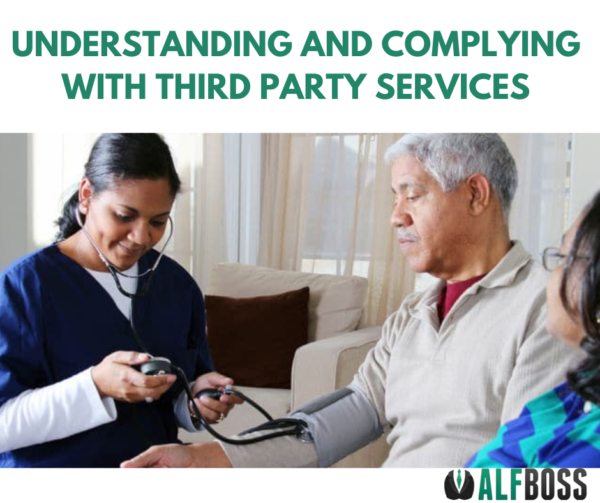
Written by: Pascal Bergeron
Assisted living facilities play a crucial role in providing care and support for residents, but it’s important to recognize that residents may have unique needs that require services from third-party providers. In order to ensure the well-being and satisfaction of residents, operators of assisted living facilities must understand and comply with the regulations surrounding third party services. This article aims to inform and educate assisted living facility operators about these regulations and suggest ways to comply with them effectively.
- Independence in Arranging Third Party Services: According to the rule chapter 59A-36.007 Resident Care Standards., residents or their representatives have the right to independently arrange, contract, and pay for services provided by a third party of their choice. These services may include licensed home health agencies, private nurses, or out-patient clinics. To comply with this regulation, assisted living facility operators should establish policies that explicitly outline the criteria for admission and continued residency, as well as the facility’s policy relating to the delivery of services by third parties. These policies should require the third party to coordinate with the facility regarding the resident’s condition and the services being provided.
- Accommodating Third Party Services: When residents require or arrange for services from a third party provider, the facility administrator or designee must allow for the receipt of those services, provided that the resident meets the admission and continued residency criteria. To comply with this regulation, operators should ensure open communication and coordination with the third party provider to facilitate the receipt of care and services that meet the resident’s specific needs. This coordination should occur whenever there is a significant change in the resident’s condition and at least once every 30 days.
- Care Coordination and Documentation: The administrator or designee of the assisted living facility holds the responsibility of ensuring proper care coordination with third party providers. Compliance can be achieved by following these guidelines: a. Documented communications: Care coordination should include documented communications about the resident’s condition and response to treatment or services ordered by the physician, which may impact the resident’s appropriateness for continued residency in the facility. b. Communication frequency: Communications should occur at least once every 30 days and whenever there is a significant change in the resident’s condition. c. Treatment or service schedules: If physician-ordered treatments or services occur less often than once a month, communications must be conducted according to the ordered treatment or service schedule and whenever there is a significant change in the resident’s condition. d. Documentation of unsuccessful communication: In cases where communication with the third party provider is unsuccessful, operators must document at least two attempts at communication on two separate days. This documentation should include the name of the person from the third party provider, the method of communication, and the date and time of the attempts. Such documentation must be included in the resident’s record within the specified timeframes.
- Facility Assistance and Documentation: Assisted living facilities may offer assistance to residents in arranging and coordinating third party services. However, it’s important to note that this assistance does not guarantee the receipt of those services. If the facility’s efforts to make arrangements are unsuccessful or declined by residents, documentation must be included in the residents’ record explaining why the efforts were unsuccessful. This documentation serves as evidence of compliance with the regulations and showcases the facility’s commitment to resident well-being.
Conclusion: Complying with regulations related to third party services in assisted living facilities is crucial to ensuring residents’ needs are met and their rights are respected. By understanding the requirements and implementing appropriate policies and procedures, operators can create a supportive environment that promotes the coordination of third party services, thereby enhancing the quality of care provided to residents. Remember, effective communication and documentation are key elements in achieving compliance and maintaining transparency in the delivery of care and services in assisted living facilities